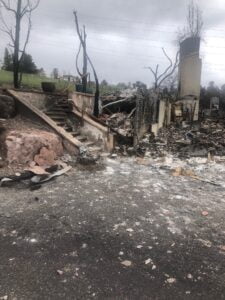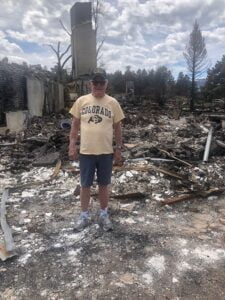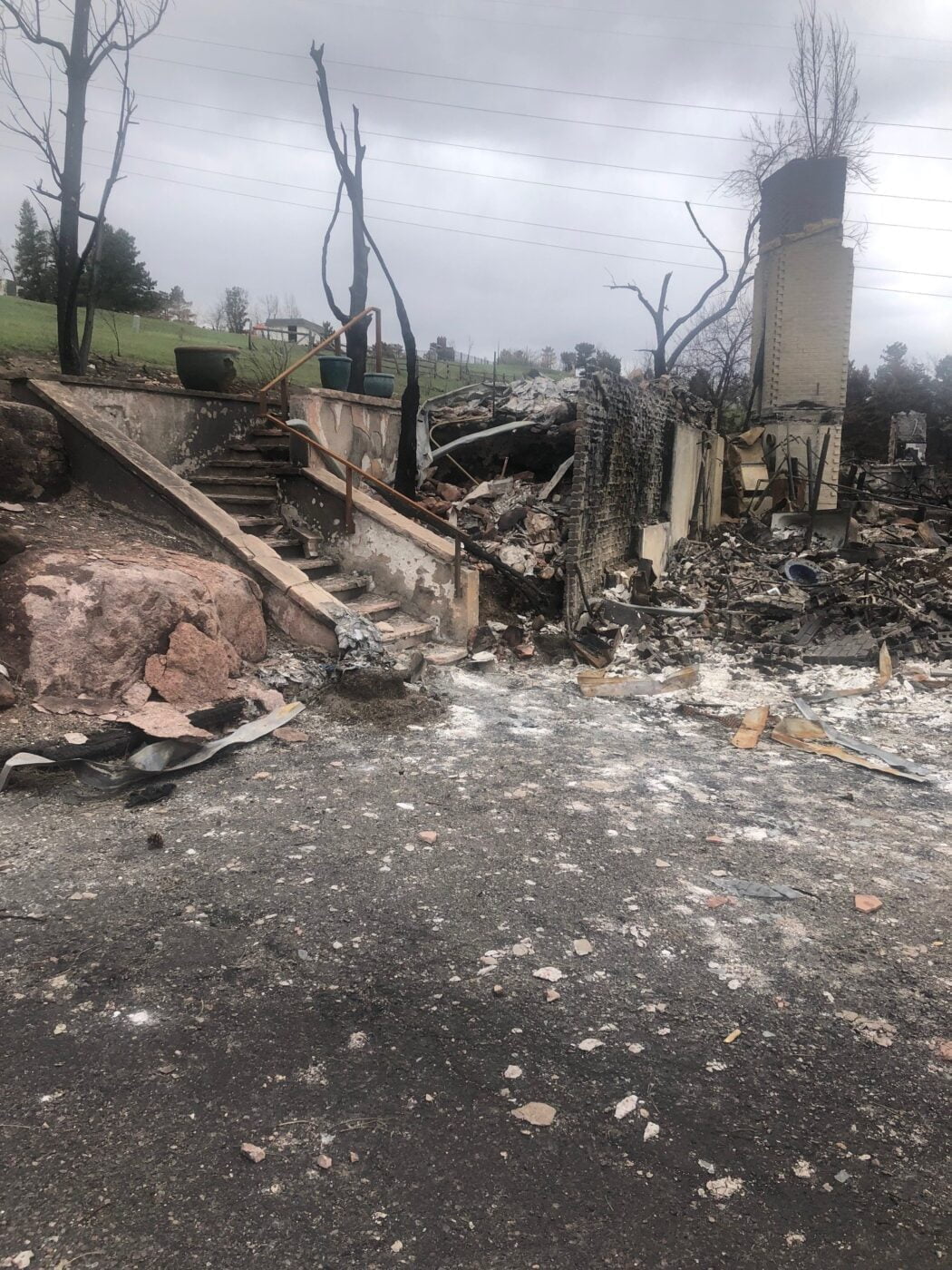From the Summer 2022 Journal of the Colorado Dental Association
The Marshall Fire started on Dec. 30, 2021 as a grass fire in Boulder County. In terms of structures lost, it is the most destructive fire in Colorado history. Very little was spared in the fire’s path and several dentists and dental professionals were the personal victims of the unforgiving flames. Here are two of their stories.
By Keaton Howe, D.D.S.

Some of the remains from Dr. Peter Steinhauer’s home of 54 years.
For the past many months, we have woken each day wondering what the future may hold. I remember a day in late spring, a Red Flag Day, where I stood quietly sniffing the sweet pink pedals from the early cherry tree blossoms. Like the adjacent 14-year-old apple tree, this tree was planted 16 years ago to honor the birth of our oldest son. Those two are the few surviving trees amid a scorched, desolate landscape burned to ash as far as the eye can see that may never loose its acrid, black odor that clings to my fears and sears my Marshall Fire memories.
Ideally, I would have never had to experience the dichotomy of utter catastrophe and inner growth yet looking back I understand that one could not occur without the other. For the first time in our lives and without much choice, we learned to humbly accept help without conditions or payback. With only the clothes that we were wearing on the day of the fire, we stayed for three days in my sister’s basement followed by three weeks in my parent’s basement. It seems silly now, but small things became extremely important: a sock, a pen, a glove. If misplaced, things that were immediately replaceable in most times now prevented me from picking up food in the winter, writing down a grocery list, or clearing the snow from my car before work. But very quickly our priorities boiled down to things that could not be replaced: telling family members you love them, sitting across the dinner table with close friends, quietly listening to other’s thoughts and emotions, and hoping to have the chance to repay other’s charity and generosity. Simple words of thanks were all we could offer when friends dropped off donated Neptune winter jackets to the four of us after their long days of work, and we struggled to accept donated bikes through the cold rain outside of Louisville Cyclery from considerate strangers. Incredibly, for two months after the fire, strangers we will never get to personally thank dropped off complete dinners at our doorstep. Though despair would sour our appetite at first, this food and unconditional kindness challenged my family to accept our community’s consideration and vow to repay such altruism to others without reward.
Reprioritization of life’s most valuable items happens when one loses everything. Yes, I can admit to becoming complacent and possibly even borderline entitled prior to the Marshall Fire, but it has taken losing everything to learn some things. I have relearned what the most valuable things are in life, and it is curious to know that my most cherished items had no cash value. Of all the valuable items that were burned up, we lament our children’s kindergarten drawings hung on the walls, wedding and family photos of good times gone by, carefully crafted poetry, diaries and writings, and small, thoughtful family gifts and heirlooms like my grandfather’s war medals. Our loss has helped us to understand the true value of irreplaceable memories and the unimportance of material goods, most of which have been replaced by now without significant meaning. We no longer need to fill our closets with clothes gathering dust but eagerly await school art projects and meaningful photos or gifts that can remind us of where we were, who we were with, and where we are going.
Even though we have grown as a family in ways we never expected, we understand that the “total loss” (one of many insurance terms I have unfortunately come to understand) of our home has changed us forever. In my mind, I had always pictured a burned house with part of the roof missing and some of the rafters damaged. I have since learned how overwhelming a total loss can be and how daunting the task is to rebuild what was once taken for granted. Like a clown who concentrates behind a red painted smile, it helped my wife and I to recognize that in the circus of activity to rebuild our lives we would need to juggle six balls in one hand: the insurance agent, the builder, the architect, the banker, the insurance adjuster (we are on our fourth assigned adjuster so does that still count as one ball?), and possibly an attorney. In the other hand, we would need to balance the spinning plates of our family on a stick: keeping the two children’s routines normal, retaining school expectations, taking care of our own mental and physical wellness, and maintaining a healthy marriage. On the foot we were not standing on, we would need to keep tempo with the drum beat of the multi-office, multi-partner specialty dental practice. It is true, we can only hope to balance all of the moving parts for as long as the show must go on, but the Marshall Fire has left us believing in the benevolence of the human spirit. Our catastrophic story has enabled us to grow from within and we endeavor to contribute to the compassionate kindness of strangers and become positive influences in our communities.
By Peter Steinhauer, D.D.S.

Dr. Peter Steinhauer standing where his home once stood in Boulder, CO.
The wind was blowing over 100 mph when we received the “evacuate now” generated call. Within minutes the smoke was pouring over the hill into our house. The electricity had been cut off and we had a very difficult time raising the garage door, using a board under the door and a herculean effort to get it up. By this time the smoke in the house was so thick, we could only see six feet in front of us. Those few minutes in the garage, choking in the smoke and not being able to raise the door were more terrifying than anything that I had ever experienced during my year in Vietnam. We were fortunate enough to get to our daughter’s house in Lafayette—generally a 15-minute drive, but that day it took three and a half hours because of the smoke and the traffic from everyone evacuating from their homes in Louisville. The bad news is that we lost EVERYTHING in our home of 54 years—the only home we ever owned—except the clothes on our backs. The good news is that we got out alive. We had our cell phones, our credit cards and our Great Dane! For the following 36 hours, we did not know the outcome of the fire for our home as the neighborhoods were all closed and guarded by the National Guard to prevent looting.
The following few days were strange. We had to purchase socks, underwear, toothbrushes, etc. Our friends and relatives were wonderful. They brought us clothes, shoes and winter coats (it snowed the next day). Later when we found a place to rent, people brought food, canned goods, bedding, plates, glasses, silverware, a coffee maker, a TV, wash rags and towels, shampoo, soap, etc. Then came the gift cards from the Red Cross, Target, Macy’s, Home Depot, Kohls, American Furniture Warehouse, several restaurants and envelopes with cash! I can’t say enough about our community that has been so helpful and generous. One day when I was waiting in line to check out of a store, a lady overheard me say to the cashier that we had lost our home in the fire. With tears in her eyes, she handed me a $50 bill. Of course, I wouldn’t accept it, but I gave her a big hug and thanked her for her kindness. Situations like this happened all the time.
After all these months this horrific event still remains a NIGHTMARE! Our insurance coverage has been great but losing everything can never be replaced. Driving through our old neighborhood reminds me of the World War II scenes of Hiroshima and Nagasaki. I recently talked to a friend who had lost his home in the mountain fire above Boulder 11 years ago. He said that anyone who has never lost a home to a disaster like this will never know the psychological impact that it will have on a family for the rest of their lives.
It’s really difficult to prepare for a disaster of this magnitude, because you think it will never happen to you. My advice is to have your important documents—your trust/will, insurance policies, titles to your home and automobiles, stocks and other investment papers and seldom worn expensive jewelry in a safety deposit box at your bank.
Make sure you are adequately insured and, most importantly, use your cell phone to take photos of the pictures in your house of relatives, important events in your life, wedding books, baby books, diplomas, awards and anything else that is sentimental in your lives. These photos are easily stored and can always be reproduced.


